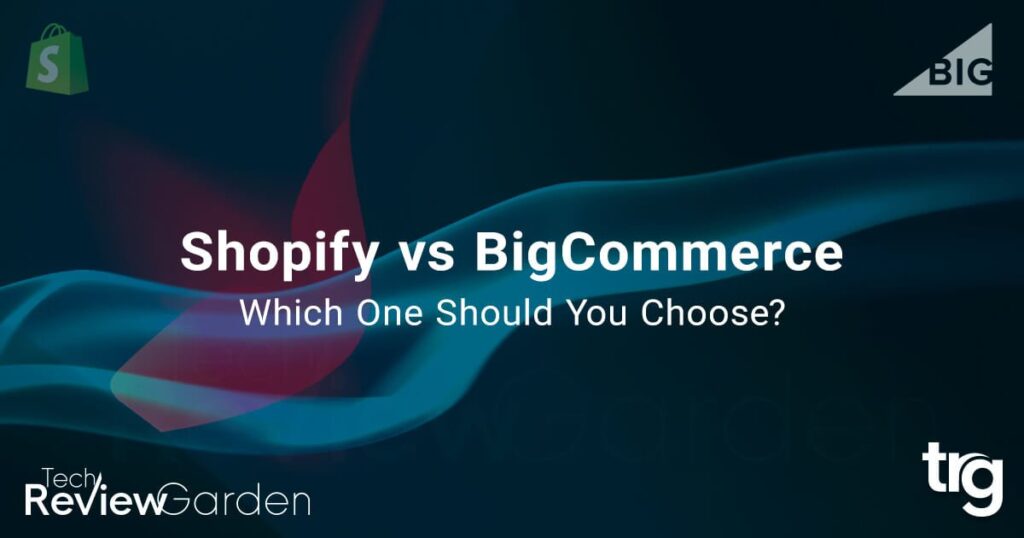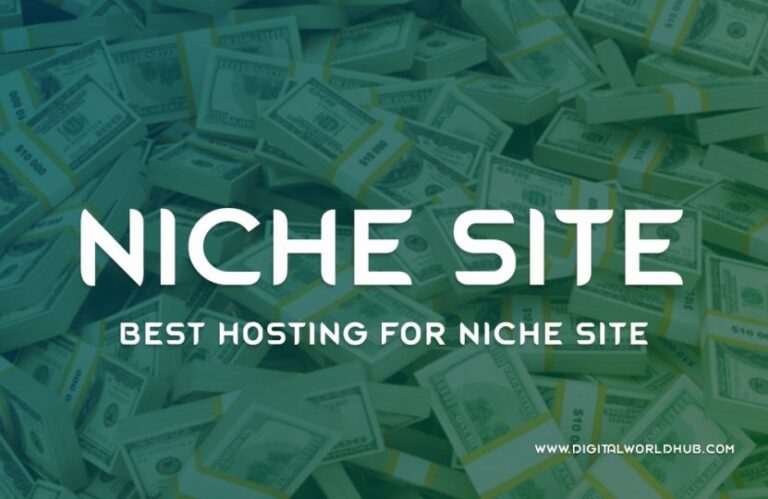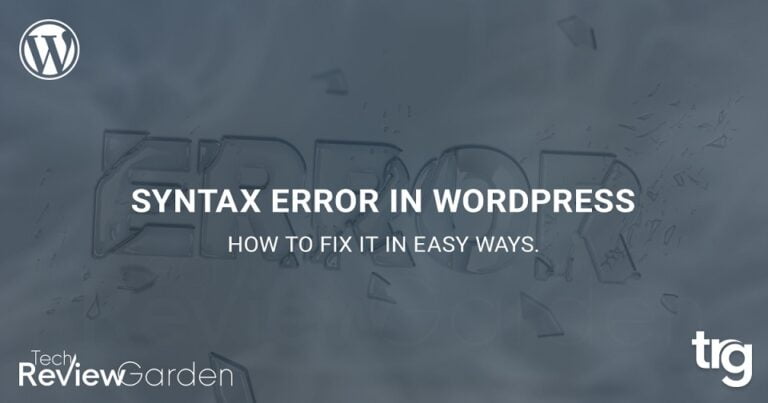There are a lot of different eCommerce platforms out there, and it can be tough to decide Bigcommerce vs Shopify Comparison Which One Should You Choose? Both BigCommerce and Shopify are excellent eCommerce site builders and eCommerce store managers, so they’re both acceptable choices.
However, there are a few major distinctions between the two platforms that might assist you in deciding which is the best option for you. While both BigCommerce and Shopify are fantastic in their own right, there are certain key distinctions that make one platform better suited to certain cases and user types than the other.
In this article, we’ll compare both, outlining the significant differences between the two to make your decision a little easier. We look at customer service, cost, ease of use, design, flexibility, and sales features – generally, everything a person thinking of opening an eCommerce store should know.

BigCommerce has become one of the most rapidly expanding businesses in the eCommerce industry. Their clients range from small businesses starting up new online stores to well-known brands like Bliss, DressUp, Toyota, and others.
Shopify, on the other hand, was started in 2006 and currently serves over 1,000,000 enterprises. Shopify is a platform that includes all of the tools needed to run a successful business. It takes care of both the eCommerce and point-of-sale aspects of the transaction. It allows you to start from the beginning without needing to be an expert.
How is BigCommerce different from Shopify? Here’s a quick comparison between them before we dive into the details.
Table of Contents
BigCommerce vs Shopify Quick Comparison
BigCommerce
- Rich built-in features
- High loading speed
- Ease of use and high customizability
- Extra fee for high volume store
- Can not switch template to the latest version
- No phone support
Shopify
- Excellent eCommerce features
- A plethora of free and paid themes
- Simplicity of usage
- Less customizability and scalability
- Heavily rely on apps and plugins
- Not really good for SEO
Both Shopify and BigCommerce offer essential features, advanced tools, and support.
Shopify vs Bigcommerce Customer Support
You must look beyond pricing plans if you want to get the most out of your eCommerce store-building experience. It is necessary for any business to have access to technical help. You never realize what kind of issue you’ll face.
Ecommerce customer service refers to how online businesses help customers with anything from completing online purchases to resolving problems, all while maintaining a consistent customer experience across platforms. As a result, in this section, we’ll compare how they handle customer service.
When it comes to supporting, whether you choose Shopify or BigCommerce, you’ll have similar options to consider. The alternatives for assistance are as follows:
- Video tutorials
- Help Center
- Support forum
- Phone support is available 24/7
- Live chat available 24/7
- Advanced specialist support
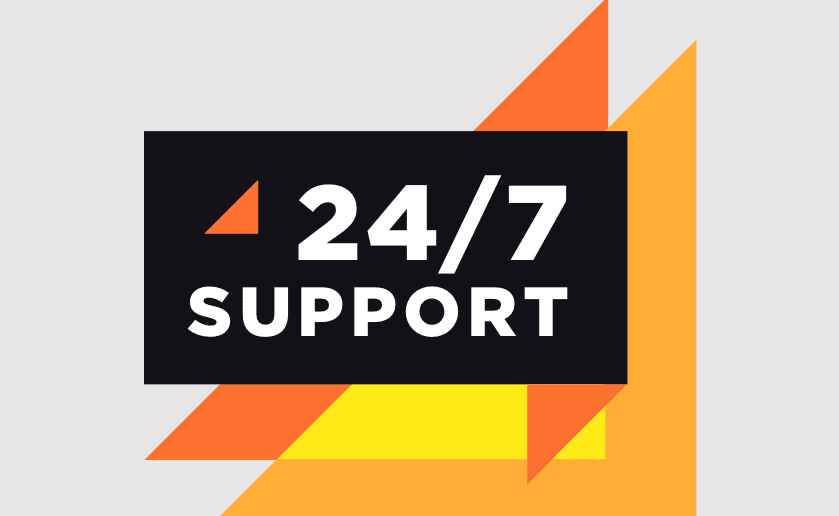
Get Started More Info
When you sign up for a free trial on BigCommerce, the platform will schedule a 10-minute conversation with you. As a result of this, you will gain a greater understanding of your business, and they will be able to provide better advice. It also prioritizes clients who sign up for the enterprise-level package. Onboarding consultants and phone calls from highly skilled BigCommerce employees will be available to you.
BigCommerce’s help center is helpful, but it’s not as well-organized as Shopify’s. The different sections in Shopify are well defined in depth.

Unlike BigCommerce, Shopify customer service provides support via social media. When you ask for assistance in the Shopify editor, you’ll be taken to a suitable page in the Shopify knowledge base. This is a fantastic assistance feature that puts Shopify forward of BigCommerce in this regard.
Shopify and Bigcommerce Pricing
“How much do they cost?” is one of the first questions that potential users ask regarding BigCommerce vs Shopify. BigCommerce and Shopify both provide free trials. They also provide price plans that range from $29 to $299. In terms of cost, Both are fairly comparable. BigCommerce is only $0.95 per month more expensive. Let’s take a closer look.
BigCommerce Pricing
The following are the four BigCommerce plans:
- BigCommerce Standard Monthly rate: $29,95
- BigCommerce Plus Monthly rate:$79,95
- BigCommerce Pro Monthly rate: $299.95
- BigCommerce Enterprise Pricing is determined by the requirements.
More significantly, BigCommerce pricing is determined by the amount of revenue you generate each year. As your company expands, this platform will automatically upgrade your subscription plan.
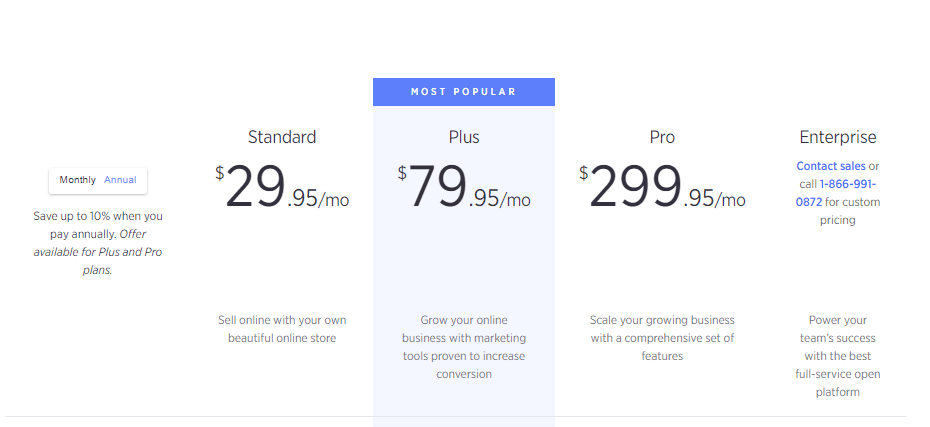
Shopify Pricing
The following are the five Shopify plans:
- Lite costs $9 per month
- Basic Shopify is $29 per month.
- Shopify costs $79 per month.
- Advanced Shopify is $299 per month.
- Shopify Plus pricing is determined by the requirements.
The main distinction between the two platforms is the types of features offered in each plan. BigCommerce has an advantage over Shopify in terms of transaction fees and unlimited staff accounts with the Standard Plan, whereas Shopify has additional transaction fees and only 15 staff accounts with the Advanced Plan.
However, Shopify’s Basic Plan includes the abandoned cart recovery option, but BigCommerce requires the Plus Plan, which might be very beneficial to you.
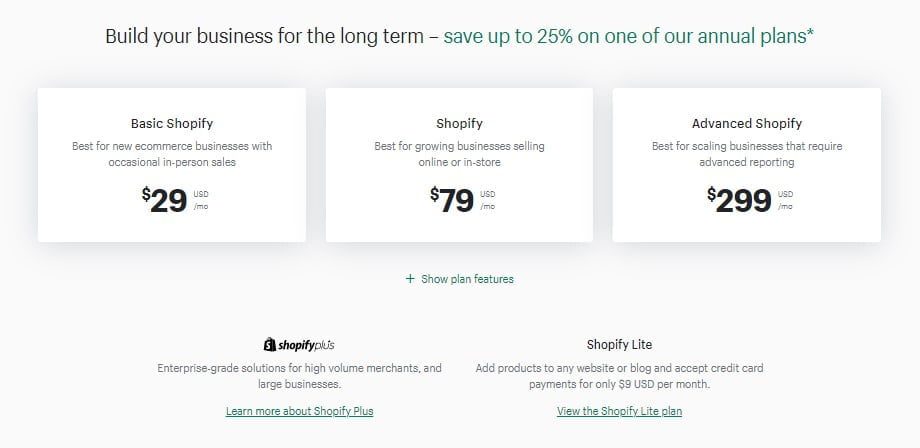
Ease of Use
Ease of use is significant not only for newbies but also for established eCommerce businesses. As a result, while comparing BigCommerce vs Shopify, this is something we’d like to consider.
The difficult part about being simple to use is that a truly user-friendly platform should be useable straight away, rather than after you’ve spent hours knowing about it. You will save more time and effort if you choose a platform with a user-friendly interface. As a result, this is a crucial factor to consider when selecting an online platform.
BigCommerce Ease of Use
On the other hand, it is less good for beginners due to its usage of a variety of technical terms. When doing basic tasks like adding a product, you may need to search for some of the particular terms to understand all of the terminologies. BigCommerce is a more difficult platform to work with due to its technical burden, but this is because of its strong in-built features, which allow for greater customization.
Shopify Ease of Use
To set up a shop, you don’t need to be a Shopify specialist; anyone can easily build an online retail store in minutes.
Overall, Shopify beats BigCommerce in terms of usability. The majority of users compliment Shopify’s onboarding experience and user-friendly editor. From the left-hand main menu, you can access all of your options, and there’s a helpful wizard that guides you through setting up your store step by step.
Designs and Flexibility
As important as it is for your store to operate properly, you also want it to look attractive enough on the front end for your customers to want to buy. Here’s what BigCommerce and Shopify’s store design options look like.
BigCommerce Themes
BigCommerce themes are organized by industry, layout, and pricing. There are a lot of industries to select from, but not nearly as many as with Shopify. On the other hand, BigCommerce’s free themes can appear a bit old, which isn’t good if you’re hoping to expand your business in the long run. This will likely necessitate a rebrand and the switch to a paid theme in the future. These are priced between $150 and $300.
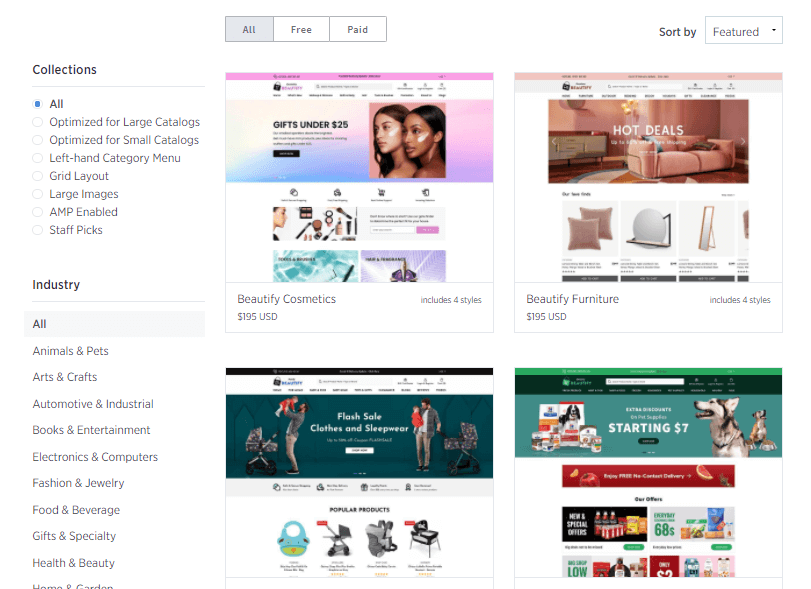
Shopify Themes
Shopify themes are available in a variety of industries and styles, with prices ranging from $100 to $180. It’s simple to choose your best theme by filtering by layout, industry, navigation style, store size, and other factors. All of Shopify’s themes are professional, whether you choose the free or paid options. The Shopify themes offer you a great deal of customization. They’re simple to personalize and appear professional. Only a few of BigCommerce’s themes are responsive to mobile devices.
However, all of Shopify’s themes, are responsive and will restructure to match the right screen size. You may also make changes to both versions to ensure that your site looks really good on any device. In the example, Shopify even allows for a mobile preview.

Sales Features
Inventory Management
BigCommerce
To control stock levels and understand order trends, this platform provides an easy, native, and strong inventory management system. With the seamless connection between offline and online channels, you can keep track of your inventory.
Shopify
Its inventory area allows you to set up inventory tracking, monitor your inventory, adjust your inventory counts, and for product variation view the history of inventory adjustments.
Sales Channels
BigCommerce
The platform includes BigCommerce Channel Manager, which is designed to help merchants increase sales while simplifying multi-channel selling. You will have the opportunity to connect your store and start selling on social media like Facebook and other sites.
Shopify
It allows you to sell your items over a variety of online sales platforms. You can keep track of your items, orders, and customers in one place by integrating each sales channel to it. It works with a variety of online sales channels, including social media like Facebook and others.
Point-of-Sale
BigCommerce
It allows you to connect your online store to a point-of-sale system, allowing you to sell both online and offline. It also allows you to handle your product catalog from a single location and sync inventory across multiple locations. Many of the POS integrations include both online and offline payment processing. To use POS with BigCommerce, you’ll require to use hardware from third-party platforms like Hike, Vend, and others.
Shopify
On the other hand, Shopify offers an iOS and Android app for a point-of-sale system that you can use to sell your products in person.
Shipping and Payments
You can set up a range of shipping options with them, including free shipping, price-based shipping charges, and calculated shipping costs from third-party carriers.
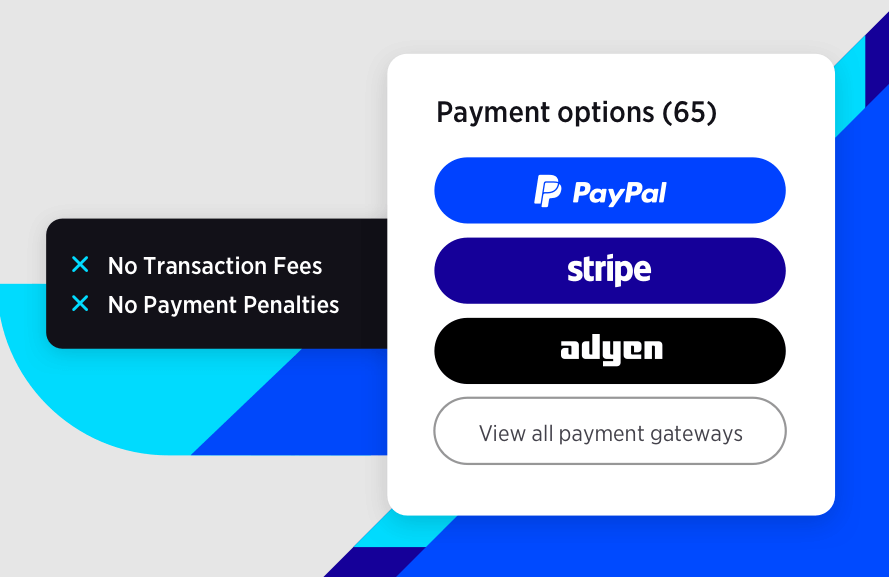
BigCommerce
When it comes to third-party real-time shipping costs, you may use this feature on any of BigCommerce’s plans, however with Shopify, you’ll require to be on the ‘Advanced Shopify’ plan. If you’re based in the United States, Canada, or Australia, and ‘Shopify Shipping’ is offered on all plans, you can acquire inexpensive shipping labels without having to create your account.

Shopify
On the other hand, it doesn’t cost you any extra transaction fees if you use the “Shopify Payments” system to process transactions. Shopify Payments is its in-house payment method, removing the requirement for a third-party payment processor. The most important thing to remember about Shopify Payments is that it is only available in select regions. If you don’t live in one of those regions, you’ll have to pay transaction costs.
Dropshipping
The key factor for drop shippers is the ability to fast and easily source products from suppliers then add them to the store and have the selling and shipping processes automated.
BigCommerce Dropshipping
It has a good app marketplace with some excellent product sourcing apps. On the other hand, the quality of BigCommerce’s other apps varies greatly, and none of them are as well-known and extensive as Oberlo.
Shopify Dropshipping
In this aspect, its connection with Oberlo is its main feature for drop shippers. Oberlo is your one-stop shop for a large collection of products at wholesale pricing. On its app store, numerous similar apps focus on different niches, marketplaces, or countries. They’re almost all highly rated and good at what they do because of Shopify’s strong curation standards.
Both platforms feature tools that allow you to do everything from source products to set up shipping through your suppliers, Its selection simply has the highest quality, and Oberlo is the one powerful tool that gives Shopify the advantage in dropshipping.
Marketing Features
When it comes to marketing your business, marketing tools and functions come in handy. Let’s compare the marketing features of BigCommerce vs Shopify.
BigCommerce Marketing
Using email marketing to reach out to customers is a good way to promote your products quickly. BigCommerce, allows you to integrate your store information with top email marketing platforms like MailChimp and G Suite.
BigCommerce provides features that are built to align with SEO best practices, which is another important marketing feature. This means that all BigCommerce sites have industry-standard SEO built-in.
In addition to having complete control over title tags, header tags, URLs, and metadata, 301 redirects are made automatically anytime the name or URL of a product, category, or web page is updated in BigCommerce. Take a look at our BigCommerce SEO guide for more information, which includes best practices for optimizing your BigCommerce store.
Shopify Marketing
On the other hand, Shopify email gives you built-in tools to build permanent customer relationships. You can choose from a variety of ready-to-use templates and start using them right away. Within your dashboard, you can also monitor and analyze all marketing activity.
Its SEO supports on-page optimization available in Shopify’s SEO. Within Shopify, 301-redirects are also simple to set up and are notified automatically when a page or product URL changes.
Both include a built-in blog, which is a simple but effective content marketing tool. It assists in the promotion of your products as well as the growth of your audience and store traffic.
BigCommerce has more built-in features than Shopify, but Shopify offers more marketing tools through its app store.
Security
eCommerce site security is crucial for a variety of reasons, including protecting customers’ privacy and sensitive information on a website, ensuring an online business’ finances, stopping fraud and financial scams, and protecting an online store’s reputation as a secure place to make transactions.
One of the advantages of integrating security for eCommerce is that you may acquire your consumers’ trust by making them feel safe purchasing from you while also securing their sensitive information and that of your online store. When you put the correct security measures in place on your website, you’re also ensuring your visitors’ privacy and integrity, as none of the information they disclose online will be used without their permission.
BigCommerce Security
As a SaaS, it protects all of the sites it hosts with various layers of security. To defend against credit card data breaches, all servers are PCI DSS level 1 certified. Firewalls, file integrity scanners, intrusion detection software, and 24/7 human monitoring are among the additional security measures. Fraudulent transactions are also protected by firewalls.
As well as an SSL certificate for a specific domain or subdomain issued by a trusted third party. It ensures that all information transmitted between a user and the site is secure by verifying that a secure web page is properly encrypted.
Shopify Security
To keep your business and customers safe, its stores are all PCI compliant by default. As a result, you can keep your payment information and business information secure.
After you add a custom domain, it will issue SSL certificates for your store. SSL certificates encrypt your store’s content and publish it securely using HTTPS instead of HTTP, which improves security.
BigCommerce Pros & Cons
Pros
- It is more cost-effective than Shopify. when it comes to pricing, both are quite similar. On the other hand, it has a tiny advantage due to its built-in functionalities and lowers additional fees.
- If you wish to change your theme, you’ll have more options.
- Has a lot more built-in functionality, thus it’s a lot more attractive.
- BigCommerce provides marketing tools and features to help you grow your business.
- BigCommerce offers the features required for your store’s safety and validation for secure online payments.
- It has a lot more features than Shopify, so customers don’t need to integrate as many apps.

Cons
- The built-in features make it far more difficult to use
- It does not have as many options for themes as Shopify does.
- Its free themes can look a bit old at times.
Shopify Pros & Cons
Pros
- Shopify provides excellent customer service. It has an advantage over BigCommerce because it takes users to relevant help pages automatically. Both eCommerce builders feature a variety of support options, but It has added social media support.
- It is more user-friendly than BigCommerce.
- Oberlo provides Shopify the edge when it comes to dropshipping
- It has all of the features you’ll need for secure online payments and shop protection.
- Shopify offers more customizable options than BigCommerce.

Cons
- Even the Advanced Plan, charges additional transaction fees and only allows 15 employee accounts.
- Third-party real-time shipping costs are only available with the ‘Advanced Shopify’ plan.
Key reasons for using Shopify over BigCommerce
There are several key reasons to use Shopify over BigCommerce. First, Shopify offers a much more user-friendly interface and is significantly easier to use. Second, Shopify has a far better selection of themes and apps, which allows for a greater degree of customization. Third, Shopify’s customer support is significantly better than BigCommerce’s.
Finally, Shopify is simply a more well-rounded platform overall and offers a better experience for both store owners and customers.
Key reasons for using BigCommerce over Shopify
There are several key reasons for using BigCommerce over Shopify. First, BigCommerce offers a much more comprehensive set of features than Shopify, including support for product variants, product options, and custom fields. Second, BigCommerce is significantly cheaper than Shopify, with plans starting at just $29 per month.
Finally, BigCommerce offers 24/7 telephone support, whereas Shopify only offers email support.
Which eCommerce platform has better SEO features?
There is no easy answer when it comes to choosing between eCommerce platforms in terms of SEO features. However, some general factors that you might want to consider include the size and scale of the platform, the range of SEO features offered, and how user-friendly the platform is. In terms of size and scale, Shopify is one of the largest and most popular platforms, which means that it has a lot of features and resources available to users.
However, this also means that the platform can be complex and difficult to navigate for beginners. In contrast, WooCommerce is a much smaller platform, but it is also much simpler and easier to use. This makes it a good option for users who are less familiar with SEO or who want a more user-friendly experience. In terms of the range of SEO features offered, both Shopify and WooCommerce offer a good selection of features.
However, Shopify offers a slightly wider range of advanced features, such as built-in support for Google Shopping ads and automatic generation of sitemaps. WooCommerce also offers a number of helpful features, such as the ability to customize permalinks and add meta tags to products. Ultimately, the best platform for you will depend on your needs.
How we tested Shopify and BigCommerce. Why do you trust this comparison?
We put Shopify and BigCommerce to the test to see which eCommerce platform is better. We looked at features, ease of use, pricing, and more. Our conclusion? Shopify is the better option for most businesses. It’s more user-friendly, has better features, and is more affordable. You can trust our comparison because we’re unbiased and experienced eCommerce experts.
FAQs – Bigcommerce and Shopify
Do I need a developer to build a BigCommerce or Shopify store?
No, you do not need a developer to build a BigCommerce or Shopify store. You can use either platform to create and manage your online store without any coding knowledge. However, if you want to add custom features or design elements to your store, you will need to hire a developer.
Do they really give me everything you need to build an online store?
Yes, they give you everything you need to build an online store. You can choose from a variety of templates and designs, or you can create your own. You can also add features such as a shopping cart, product reviews, and more.
Which Has Better Value for Money?
There is no easy answer when it comes to deciding which has better value for money – it all depends on your personal circumstances and what is most important to you. If you are looking for the cheapest option, then mass-produced items from big box stores are usually the way to go.
However, if you place a higher value on quality and uniqueness, then handmade goods or vintage finds are typically a wiser investment. It really boils down to what you are willing to spend and what you hope to get out of your purchase.
There is no easy answer when it comes to deciding whether or not to switch from BigCommerce to Shopify. Both platforms have their pros and cons, and it ultimately depends on your specific needs and preferences as a business owner. If you’re not happy with BigCommerce for whatever reason, then it might be worth considering a switch to Shopify.
However, be sure to do your research first and make sure that Shopify is the right platform for you.
Yes, BigCommerce integrates with Shopify. You can use the BigCommerce for Shopify app to connect your Shopify store to your BigCommerce account. This app allows you to manage your products, orders, and customers from one central location.
There is no one-size-fits-all answer to this question, as the best platform for your business will depend on a number of factors including your budget, the type of products you sell, and your preferred features and functionality. However, some popular alternatives to Shopify include Wix, BigCommerce, and WooCommerce.
I think Shopify’s biggest competitor is BigCommerce. However, some popular competitors to Shopify include Wix, Magento, and WooCommerce.
As the best eCommerce platform for your business will depend on a number of factors, including your budget, the scope and complexity of your eCommerce operation, and your specific industry and business needs.
Yes, BigCommerce is good for small businesses. It is easy to use and has a wide range of features that small businesses need. Additionally, BigCommerce offers a free trial so businesses can try it out before committing to a paid plan.
There is no easy answer as to which platform is easier to use, BigCommerce or Shopify. It really depends on the person’s level of experience and comfort with technology. Those who are already familiar with eCommerce platforms and have some coding knowledge may find Shopify easier to use, while those who are new to the world of online selling may find BigCommerce simpler to set up and use. Ultimately, it comes down to personal preference.
Shopify is cheaper than BigCommerce for a number of reasons. First, Shopify offers a lower monthly price point for its basic plan. Second, Shopify offers a more comprehensive set of features than BigCommerce, which makes it a better value overall. Finally, Shopify also has a lower transaction fee, which can save you money on each sale.
Shopify does have better SEO compared to other eCommerce platforms. This is because Shopify is a hosted platform, which means that all the technical aspects of running an online store are taken care of by Shopify. This includes things like site speed, security, and scalability. Plus, Shopify has a team of dedicated SEO experts who are constantly working to improve the platform’s search engine optimization.
Yes, BigCommerce is good for SEO. It offers a lot of features that help you optimize your site for search engines, including a built-in blog, customizable URLs, and meta tags. Plus, its platform is designed to be fast and responsive, which helps improve your site’s ranking in search results.
Final Words
BigCommerce and Shopify are both outstanding site builders and online managers, and the two have a lot in common. Overall, it’s difficult to choose a clear winner when comparing BigCommerce with Shopify. Finally, there are some significant differences between the platforms that might assist you to choose between the two when deciding which one to use.
Finally, the decision is yours to make; ideally, this Bigcommerce vs Shopify Comparison article has provided you with enough data to assist you in choosing the right platform for your business.
Still, If you are confused about Bigcommerce vs Shopify which One Should You Choose? Then read the following articles.
What are your thoughts about this service? I’d love to hear about it in the comments section below! If you like this article please give us a like and share this on social media.

